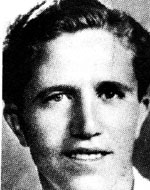Alcchi, Mordechai
Son of Ora and Abraham. He was born on October 10, 1925, in Petah Tikva. He knew poverty and deprivation from childhood, and at a young age he began to bear the burden of labor, yet he was full of joy and lived to amuse and amuse his friends and also to help them when needed. As a sports enthusiast he joined the Maccabi Hatzair club in the moshavah and excelled in swimming. In 1941 he won first place in a national swimming competition as a representative of Maccabi Avshalom. In 1943, he joined the ranks of the Irgun, and since then the activity of the underground has filled his entire time and personality, and he soon became the name of a daring fighter, and as one of his comrades says: “It seems to me that his boldness, courage and exemplar. The first action he took was the attack on the Qalqiliya police on the eve of Yom Kippur 5705. The soldiers came to the site late and the police, who knew about the Etzel attacks on the other police fortifications that night, opened fire on them and wounded several of them, and Mordecai showed self-sacrifice in rescuing his wounded comrades and bringing them to the base. In the British military camp at Rosh Ha’Ayin, in the exhibition grounds in Tel Aviv and Netanya, in an attack on the police fortress in Ramat Gan, etc. In the action of “the night of the beatings” of 29.12.1946 – an act of retaliation by the Etzel for beating one member of the organization – On the way, they encountered a police checkpoint and opened fire on them. One was shot and killed, the other four were taken prisoner and for several days the British abused them severely. When their trial before a military court did not recognize the jurisdiction of the court for the dunam and did not participate during the trial. Three of them – Mordechai, Yechiel Dresner, and Eliezer Kashani – were sentenced to death. On April 16, 1947 Mordechai Elkhi was brought to the gallows together with Dov Gruner, Yehiel Dresner and Eliezer Kashani. It was in the darkness of night, without being allowed to part with his loved ones. He was hanged while singing Hatikvah on his lips. He was laid to rest in the cemetery in Safed. His name was immortalized in “Memories of Netzach,” the memorial book for fallen soldiers of the Irgun Zvai Leumi.
